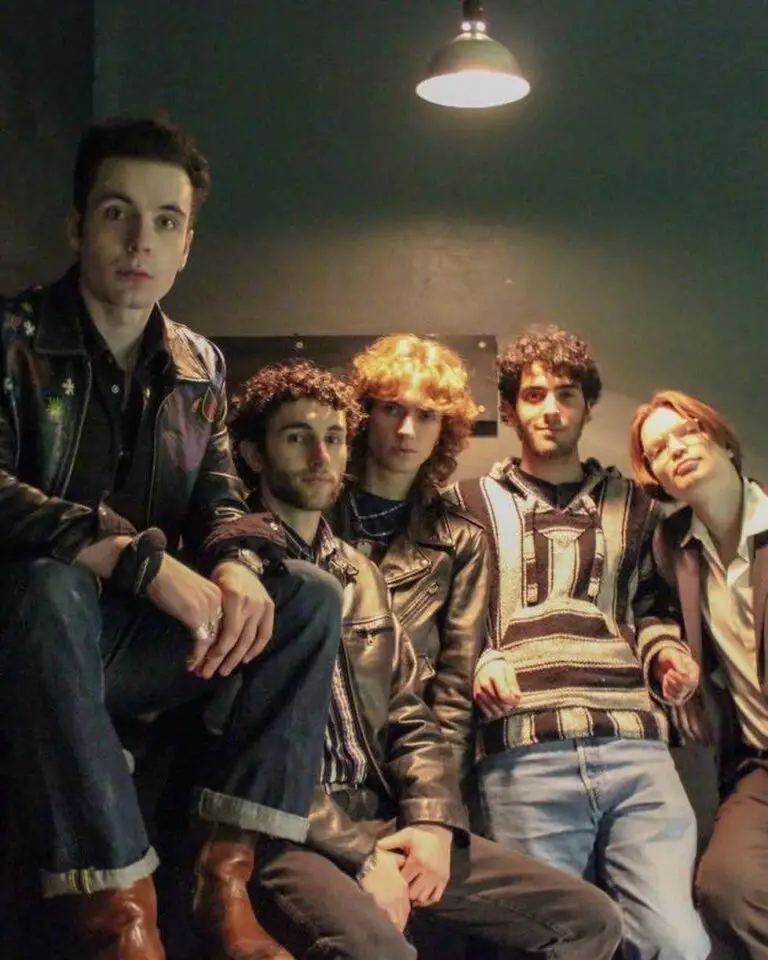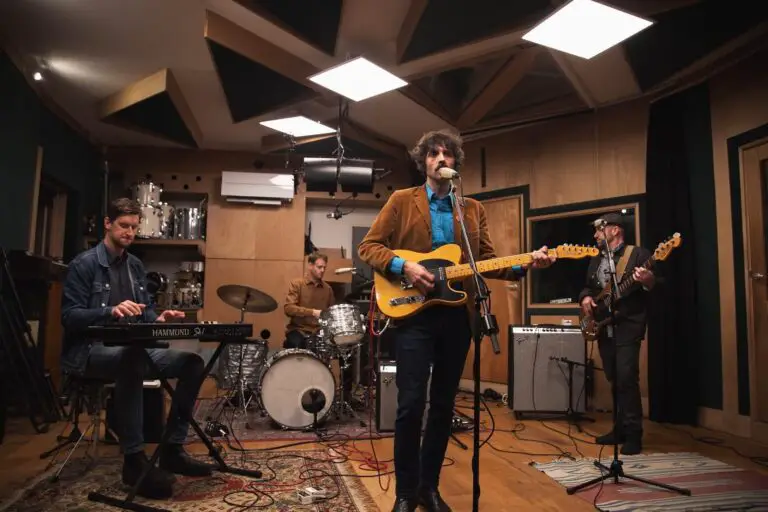Canadian Indie Rock artists and bands are the subject of navigating artistic integrity in a streaming-driven music economy.
In an era dominated by streaming platforms and metrics, musicians face the paradox of maintaining artistic integrity while meeting the industry’s demands for measurable success. Canada’s evolving indie rock scene offers a refreshing counterpoint to commercialized forces in the music industry. Indie and folk-rock artists like Cameron Stewart of Meteor Heist, Finbar Wall of The Commune, and Jerry Leger, who plays in Jerry Leger and The Situation, The Psych Fi’s, and The Influences, prioritize creative expression over mainstream pressures.
This trend resonates with artists seeking control over their art, whether in Canada or New York—a region with its own storied musical legacies and challenges. Their approach shows that, even in a results-driven industry, room remains for artists who prioritize creativity and integrity over temporary metrics, regardless of the industry’s global epicenters.
The Pressure of Streaming on Artists
This dedication to creative authenticity is often undermined by the very platforms that have transformed the way music is consumed. Streaming services, like Spotify, have undeniably transformed the music industry but come with notable downsides. The demand for more content, frequent releases, and a discovery system driven by algorithms compel many artists into a relentless cycle of production, often at the expense of creativity.
As Jerry Leger pointed out in a November 2024 conversation, “Artists have to create more content… release a single every two weeks… to try to make a little bit more money”. This focus threatens to dilute artistic expression, and the emphasis on immediate metrics devalues the importance of refining one’s craft and the steady, organic progress that used to characterize musical artistry.
Both Wall and Stewart echo these concerns. Meteor Heist guitarist Cameron Stewart (second from the left), also known for his evocative and nuanced songwriting, admits that while streaming can amplify an artist’s reach, it fails to replace the connection built through live performances. “It’s hard to get new listeners to your music… if you don’t sell well, the venue probably doesn’t want to book you back.” For Stewart and Meteor Heist, the pressure to conform to streaming trends contrasts sharply with the emotionally charged music they seek to create.
Unlike pop artists, whose success largely hinges on social media algorithms, bands like Meteor Heist build their presence differently. “For indie bands, it’s more about something that happens around town,” Stewart explains. “Live performances are huge. For people who do pop music, a lot of their career is based online. In contrast, many indie bands rely on word of mouth, loyal fan bases, and community engagement.”
Meteor Heist prioritizes building real-world communities. “It’s more physical,” Stewart explains. “You release music online, sure, but the focus is on real audiences.” Cameron also reflects on how the ease of content creation has affected live music: “Community comes from people going out… and that’s been a problem. People don’t go out as much.” His reflections illustrate a shift in the arts, where technology has democratized and diluted creative expression.
Cultivating Creativity and Community
Despite these pressures, these musicians have remained steadfast in their commitment to their craft and the communities that support them. Finbar Wall’s new album, The Fall, delves into themes of redemption and hope, emphasizing his view that music should be a collective experience. As the lead vocalist, guitarist, and founder of the folk-rock band The Commune, Wall personifies this belief, expressing that his music consistently mirrors the influence of community, family, friends, and collaborators, all of whom have played vital roles in his personal and artistic growth.

For Wall (above, with The Commune), songwriting is more than just crafting melodies and lyrics; it’s about conveying music with deep intentionality. “When I listen to music, I try to give it the same attention I would want someone to give my work,” he remarked in a November 2024 interview. The process of creating music is a meticulous craft, requiring both the artist and listener to engage deeply. This philosophy extends to his approach as a songwriter: “My role in the band as the primary songwriter means I do more reading than listening,” he explained. He draws inspiration from the narratives and ideas around him, often overheard conversations and literary influences. “You hear such great things when you get your head out of your phone and take your headphones off—there are gems in conversation that make for great songs.”
Similarly, singer and songwriter, Jerry Leger (center above, with The Influences), whose country-rock style blends grit, heart, and authenticity, underscores the value of direct engagement with audiences through live performances. “There’s a different connection… seeing a band is a more valuable connection,” he says, reflecting the sentiment shared by Wall and Stewart.
For Leger, the power of music lies in the personal connection between the artist and the listener, an experience that streaming platforms often fail to recreate. This connection, rooted in shared experiences and emotional resonance, is central to Leger’s musical philosophy, aligning with the values of authenticity and community that define his work.

The Loss of Artist Development: A Changing Landscape
Another growing concern is the loss of artist development, once a cornerstone of the music industry. In the past, artists were given the time and space to grow creatively through “development deals” that allowed them to release multiple records before achieving commercial success. This model fostered long-term careers and allowed artists to evolve naturally. However, as Leger points out, that model has largely disappeared. “It might take three records before something hits,” he says, but with today’s music industry focused on immediate returns, labels often drop artists who fail to create instant hits.
For indie musicians, this rapid turnover is a formidable barrier to building sustainable careers. Stewart reflects on this shift: “Success on streaming platforms doesn’t necessarily translate into a live following. Just because you hit the algorithm and have a lot of streams online doesn’t mean that you’re going to have more people at your shows.” The disconnect between online streams and live engagement illustrates how the industry now prioritizes fast results over gradual, organic growth.
Despite concerns, Wall remains confident that dedicated musicians will continue to create. “The people who write songs and make music do it anyway,” he asserts. “History has shown resistance to innovation before. There were people who loved pure folk music and thought the electric guitar was going to ruin music. Rock and roll was called the devil’s music. But the people who loved making music kept doing it.”
Finding a Way Forward: A Return to Artist-Centered Models
The experiences of Wall, Stewart, and Leger reveal a fundamental truth: the industry’s reliance on metrics and data often undermines the creative process. In contrast to the quick turnover of streaming, these musicians emphasize the importance of authenticity, live engagement, and community. By fostering real relationships with their audiences and telling deeply personal stories through their music, they are cultivating long-term connections that go beyond the constraints of digital metrics.
For Jerry, success isn’t about playing to the crowd or the algorithm but about making music that feels authentic to his own experience and values. “I don’t make music that a lot of people can get into in 30 seconds,” he asserts. “It’s not the kind of music that’s very image-driven.” His resistance to compromise in the pursuit of commercial success highlights the struggle to maintain artistic integrity in an era increasingly dominated by streaming platforms and AI-generated music.
The Ethical Dilemma in the Age of Streaming and AI
As artificial intelligence continues to influence multiple industries, ethical considerations are growing, particularly in the realm of creative content. Spotify’s “Perfect Fit Content” (PFC) program, as uncovered by independent journalist Liz Pelly and discussed in Ted Gioia’s article on Spotify, reveals a troubling trend of corporate exploitation in the music industry. Artists from ambient to jazz are being replaced by AI-generated or generic tracks designed for passive consumption, where music becomes a tool for maximizing streams and profits rather than a product of personal creativity. This reflects a broader issue within the tech industry: platforms prioritize algorithmic engagement over artistic integrity, undermining the consumer’s experience and the artist’s livelihood.
Gioia’s article highlights how obscure, possibly non-existent artists dominate Spotify playlists, inflating track numbers to boost profits. This mirrors concerns in other creative industries where algorithms and AI tools are used to push content based on profitability rather than quality or authenticity.
Reflecting on the potential for AI to replicate iconic voices or even compose songs, Jerry acknowledges some benefits, particularly in historical preservation. “It’s pretty wild how far it’s come… they can match the voices, but it’s kind of eerie,” he shares. While AI technology can enhance the fidelity of older music, Wall doubts it can replicate musicians. “I don’t think AI Billie Holiday is going to make anyone proud. I don’t think anyone’s going to hear an AI Hank Williams and say, ‘That’s near the divine.’ The greats are so close to the unknown and divinity. I don’t think technology can replicate that.”
As AI-generated content increases, questions about ownership and the loss of individuality in art become more pressing. These concerns become even more complicated when you consider how AI tools are now being used to churn out content at an industrial scale, further commodifying art and eroding the distinctiveness of individual voices in music.
In this rapidly evolving landscape, it’s not just about avoiding manipulated playlists; it’s about reclaiming control over how we experience culture in an age of technological advancement. The future of music may lie in rediscovering the principles that once helped musicians grow over time, by shifting away from the focus on immediate returns and embracing grassroots engagement, artists can once again find success not just in numbers but in the emotional and societal impact of their work.
For more information, visit: Meteor Heist, The Commune, and Jerry Leger on Apple Music and other streaming platforms.



Comments are closed.